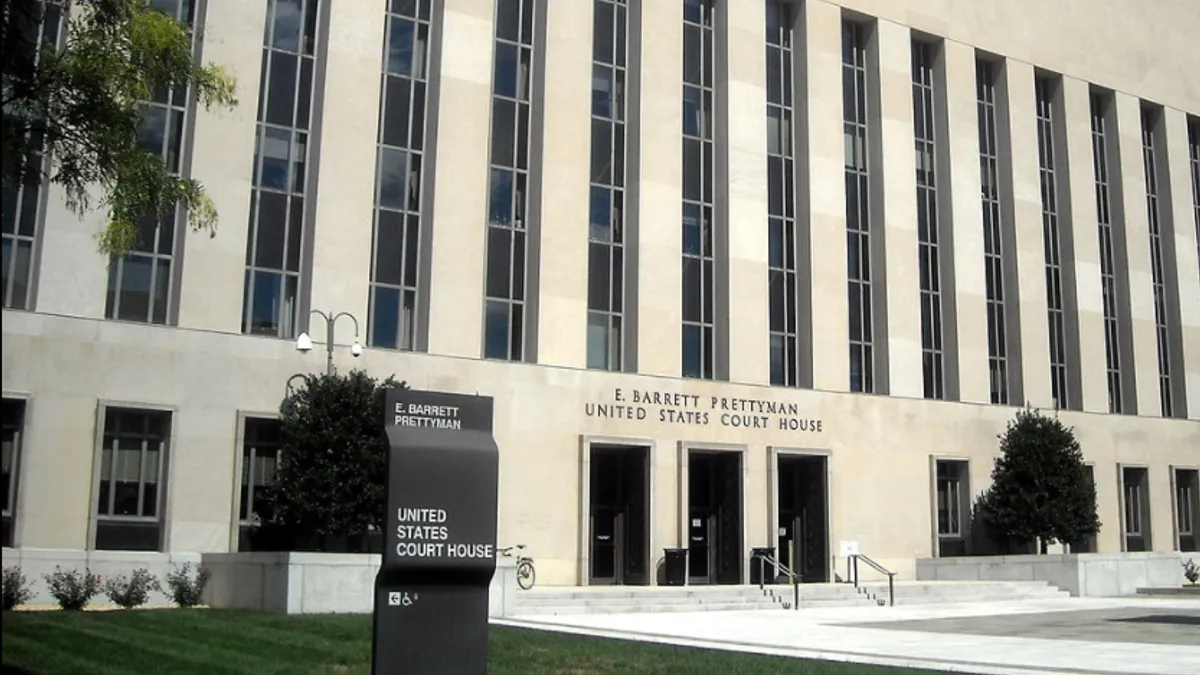Dive Brief:
- The Associated General Contractors of America filed suit yesterday to compel the Small Business Administration and the Office of Management and Budget to revise the questionnaire being used to reassess whether companies were eligible for Paycheck Protection Program loans.
- The AGC is also asking the United States District Court for the District of Columbia to restrict use of the information that the questionnaire generates until the SBA makes it available to the public and revises it.
- “The administration has every right, and obligation, to ensure businesses were eligible to apply for and receive the relief loans,” said Stephen E. Sandherr, AGC CEO, in a statement. “But they do not have the right to use a secretly crafted form to gather unprecedented amounts of proprietary information that has little or nothing to do with the economic uncertainty that led businesses to apply for the loans in the first place.”
Dive Insight:
The SBA is mandating that businesses that received loans of more than $2 million complete a loan necessity questionnaire regarding their operations and financial conditions during the pandemic. It requests information about gross revenues, capital improvement projects, dividend payments and compensation, including whether any employees earn more than $250,000.
The AGC's complaint asserts that the process that produced the form, and the form itself, violate the Paperwork Reduction Act and the Administrative Procedures Act, and that the federal agencies failed to meet the minimum standards for due process. The association is requesting the court to declare that the questionnaire is arbitrary and capricious, and to declare that the SBA cannot lawfully use the information that the form generates to find a company ineligible for a PPP loan or deny a company’s application for forgiveness of its loan.
The association noted that the Coronavirus Aid, Relief and Economic Security Act (which established the PPP program) only required loan applicants to make a “good faith certification that the uncertainty of current economic conditions makes necessary the loan request….” Instead of asking borrowers about this uncertainty when they originally applied for their loans, the form attempts to set a means test, a revenue reduction test and a liquidity test that Congress never contemplated, and it focuses on later events that few companies could have predicted when applying, the trade group said.
The two agencies also disregarded the legally mandated process for developing a questionnaire, the AGC said. OMB authorized the SBA to use the form in secrecy, instead of releasing it and providing a 60-day period for public comment. The agencies also violated the Administrative Procedure Act by arbitrarily declaring — to bypass the normal review process — that the new questionnaire required approval on an “emergency” basis and did not constitute a change in the scope of SBA’s prior information collection process.
“Resorting to a secret form that disregards congressional intent and retroactively changes the criteria for a loan is not due diligence; it is unlawful and needs to stop before employers are irrevocably harmed,” Sandherr said.
The form has generated pushback from a variety of business groups. More than 80 associations, including several representing the construction industry, sent a letter to congressional leaders Nov. 17, saying that the questionnaire “introduces a confusing and burdensome process” for both borrowers and lenders. The coalition also fears it could “lead the agencies to inappropriately question thousands of qualified PPP loans made to struggling small businesses.”
The form contains two sections for the borrower to provide details about business activity and to assess liquidity. Information that must be completed includes gross revenue since March 13, mandated shutdowns that affected operations and several questions regarding liquidity, certified public accountant Jack Callahan told Construction Dive.
The SBA has indicated that it will use the questionnaire data to evaluate the good faith certification made on the PPP borrower’s application that states that economic uncertainty made the loan request necessary, Callahan said. The SBA has said it is necessary in order to maximize program integrity and protect taxpayer resources.
The completed form is due to the lender within 10 business days of when the borrower receives it and within five business days after that, the lender servicing the loan is required to upload the document and documents to the SBA PPP Forgiveness Platform.
The form is required even if the borrower is not seeking forgiveness, Callahan added.















